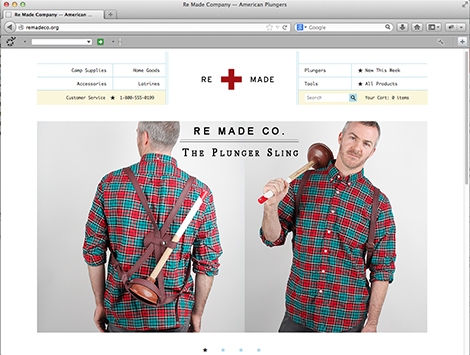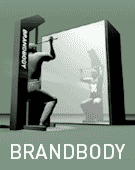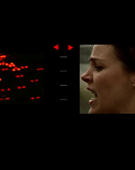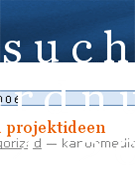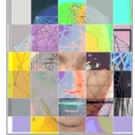Re Made Company uses recreation to directly echo and parody the rhetoric around current designer tools, which includes the language of authenticity, appropriation of working class identities, and a revitalization of traditional male roles. The artwork exists as a "company" via website and social media. Re Made Company recreates an existing brand - Best Made Co. - with a shift to the central product. Re Made Co. replaces BMC's axe with a plunger, which offers men similar opportunities for identification as self.
Re Made Co. uses the same means of distribution as the original work (the internet) to reach the identical audience. The website features product descriptions, promotional material, videos, and reviews. Texts are based on original BMC posts and publications, but shifts in context, users and products reveal the pretension of those statements. The artwork critiques the ways that commerce juxtaposes sophisticated graphic design with photographs of rugged men and activities to reassure their consumer community that they can simultaneously enjoy modern life and identify with their pioneer selves.
The work is interactive, a kind of kinetic sculpture that changes in response to BMC’s posts and developments, to online reviews, comments, and followers. This approach to art practice extends the boundaries of internet art by encompassing multiple facets of communication (website, Facebook posts, Twitter feeds, emails, blogs, online magazines) and by allowing us to plot the course of the artwork over time in response to shifts such as browsers contributions to content and BMC changes to their site.
Work metadata
- Year Created: 2014
- Submitted to ArtBase: Wednesday Mar 26th, 2014
- Original Url: http://www.remadeco.org/
-
Work Credits:
- ReMadeCo, primary creator
Take full advantage of the ArtBase by Becoming a Member
Artist Statement
Re Made Company explores the recent phenomena of the “urban woodsman” as a high-culture consumer who identifies with blue-collar work and perceived pioneer lifestyle. The research begins with a case study analysis of the brand Best Made Company, who sells their central product - a line of axes - online and in their Tribeca, New York City store. Most of these finished and painted axes, priced in the $150-$300 range, find a home in an urban environment, hung on the wall to imply a labor that’s never actualized.
Best Made Co.’s target market is the urban woodsman and Re Made Company focuses on that brand because of their efficacy in propagating strategies that encourage users to see their products and brand as part of self: The product is a tool approximating a human appendage to suggest the user has greater control over their body. The organization provides focused activities for consumers to paint, sand, and restore the axe, encouraging them to invest energy into the product and form greater attachments.
Re Made Company replicates this consumer experience by finishing, painting, branding and fetishizing a masculine tool, by providing online forums for men to renounce white collar values and play out virtues of self-reliance, initiative and ruggedness, and by offering events such as plunger restoration workshops.
